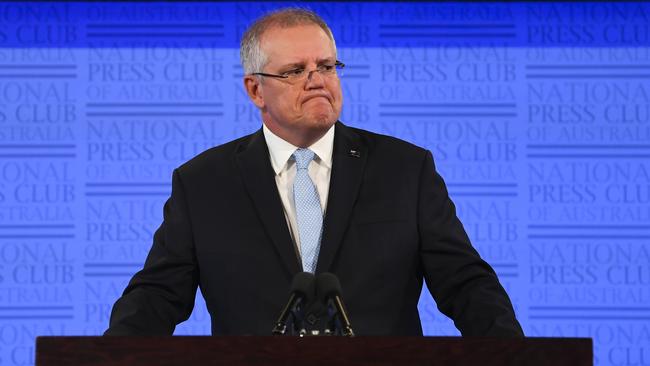Coronavirus: Industrial peace accord for post-crisis jobs and growth

The Prime Minister — mindful of political snags to ambitious industrial relations reform, while capitalising on capital and labour amity — has taken a low-risk approach to workplace change in quick time. He said the system has “retreated to tribalism, conflict and ideological posturing”. Mr Morrison urged parties to “put their weapons down” and focus on settings where everybody can benefit, meaning higher profits, more jobs and increased wages. Working groups will negotiate on five areas: award simplification; enterprise agreement making; casuals and fixed-term employees; compliance and enforcement; and greenfields deals for new enterprises. To smooth the path, Mr Morrison is dropping the union-busting Ensuring Integrity bill.
Enterprise bargaining is busted. The system was meant to deliver flexibility and productivity improvements at the workplace but has become moribund. Labor’s 2009 Fair Work Act says the industrial umpire must be satisfied “each award-covered employee and each prospective award covered employee” would be better off overall under any new agreement. That test is a job killer, especially for small business. But Coalition governments, haunted by Work Choices, have not acted on calls to reform it with a “no disadvantage” test, in the spirit of Paul Keating’s original act. While Mr Morrison says he does not want to tell unions and employers what to do on this matter, he emphasised “if there’s no business, there’s no job. There’s no income. There’s nothing.” The pandemic has led to odd couplings and less black-letter work to rule. The government hopes pragmatism will rule in the recovery.
The other compact for revival is between Canberra and the states. The national cabinet has done its job well, especially in the medical response. Mr Morrison wants to use the co-operative vibe to solve specific problems, such as improving an unresponsive training system. Mr Morrison sketched out reform of a clunky skills system that is failing the needs of industry and students. Often young people go to university when their best choice would be a trade because the training system is difficult to navigate and is decoupled from the job market. Despite the incoherence, complexity and poor quality of the National Agreement for Skills and Workforce Development, the federal government still hands over $1.5bn in untied funding. Mr Morrison is prepared to offer premiers and chief ministers more money as a carrot if they can improve their training systems, mirroring agreements Canberra has with them on hospitals, incorporating national efficient pricing and activity-based funding.
The existing Council of Australian Governments is overly bureaucratic, its agenda all-encompassing. The new grouping, forged in crisis, has political horsepower, focus and works with speed. Mr Morrison wants job creation to be its new mission. Of course, this will pay huge dividends for states and territories, shoring up their tax bases and attracting companies. NSW Treasurer Dominic Perrottet has led reform of federal finances. A grand bargain on taxation — where states ditch anti-growth and mobility taxes, such as payroll tax or stamp duty, but are not financially worse off — must be on the cards. Regulations and imposts that destroy jobs or disadvantage small enterprises, such as fringe benefits tax, should be part of a holistic agenda.
Although his thrust was industrial relations and skills compacts, Mr Morrison said the focus of supply-side reform had to be “what generates investment and what creates jobs”, or what makes the economy run faster, to draw on the Kiwi sailing motif. The Prime Minister strongly reaffirmed a commitment to open, free and fair trade; to living within our fiscal means; building on our core industrial, financial and resources competencies; and aspiration, “having a go, and getting a go” in his schema. If we want to raise productivity and material living standards, we need better incentives to start businesses, deepen our capital stock and develop new products. We need to properly price infrastructure and reduce hurdles on major projects. Rather than ad hoc capital allowances, the government must put wind in the sails of businesses in October’s budget via a company tax cut. Industrial peace in our time is necessary. But a dynamic business sector, which can compete globally, offers a higher prize for all.


Scott Morrison has delivered a rallying call on job creation, seeking compacts on skills development and industrial relations to underpin recovery after the economy’s stint in intensive care. Canberra, the Prime Minister said in a speech on Tuesday, has a part to play in transition but not through the power of borrowed money. The government will be, he vows, an enthusiastic partner and facilitator of new accords rather than the central controller. The way forward will be via Australian values, strengths and institutions. But Mr Morrison did look over the ditch to encapsulate his modus operandi. In defending the America’s Cup in 2000, Team New Zealand’s chief Peter Blake focused on a single strategic question: Will it make the boat go faster? It’s a test we need to entrench for growth policies that we pursue in a post-pandemic world.